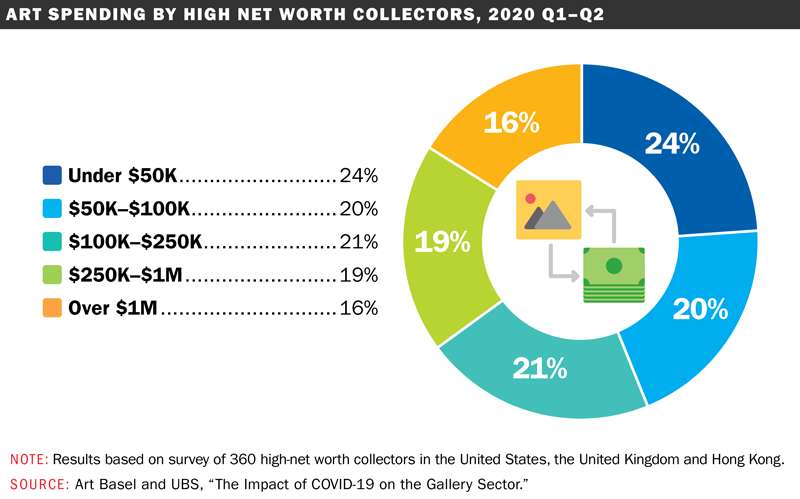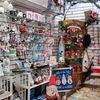
Processing Your Payment
Please do not leave this page until complete. This can take a few moments.
- News
-
Editions
View Digital Editions
Biweekly Issues
- December 15, 2025
- December 1, 2025
- Nov. 17, 2025
- November 03, 2025
- October 20, 2025
- October 6, 2025
- + More
Special Editions
- Lists
- Viewpoints
-
Our Events
Event Info
Award Honorees
- Calendar
- Biz Marketplace
Picture this: Art collectors keep Maine artists, dealers busy during pandemic
 Photo / Tim Greenway
Emma Wilson, director of the Portland Art Gallery, says 2020 was the gallery’s "best year by far."
Photo / Tim Greenway
Emma Wilson, director of the Portland Art Gallery, says 2020 was the gallery’s "best year by far."
Retired teachers John McIlvain and his wife, Elizabeth Sky-McIlvain, acquired their first sculpture about 20 years ago — an abstract stone and wood creation called “Little Buddha” by Herb Ferris they placed in their Georgetown garden.
Currently covered in snow, it sits in a circular raised garden on grounds they normally open to visitors every spring when there’s not a pandemic.
“We love the idea that people can see these things, and with some luck might also go and buy some [for themselves] because it’s nice to support the artists who do wonderful things, many of whom are from Maine,” McIlvain says.
The couple discovered Herb Ferris and his work through Pownal-based dealer and consultant June LaCombe and have been buying sculpture ever since. They now have around 30 pieces, including a number of works by Maine-based artists.

Despite a challenging time for art galleries worldwide during the pandemic, devoted collectors like the McIlvains are keeping Maine dealers — and artists — busy. That’s creating excitement in the art world about a pivotal moment in Maine, akin to New York in the 1950s or California in the 1970s and 1980s.
“The people who bought California art at that time are millionaires now, but you have to be brave and commit,” says Susan Larsen, executive director of the Dorothea and Leo Rabkin Foundation, an artist-endowed charitable foundation based in Portland. “Those who spend the time and make the effort will be rewarded financially as well as aesthetically.” She adds that “downtown Portland has a very fertile art scene right now, and it doesn’t take a large budget to fill your apartment or your home with first-rate stuff.”
Dinah Minot, executive director of Creative Portland, has a similar observation from a collector’s standpoint, saying, “My investment in art is always for personal reasons, whether it’s somebody I know or the impact of the art. But many of those investments have turned into becoming collectible artists.”
Global market, local gallery scene
The global art market had $64.1 billion in sales in 2019, or 5% below a year earlier, according to a March 2020 report by Art Basel and UBS.
Since then, a mid-year report by the same groups shows that while galleries saw a 36% drop in sales in the first half of 2020 and the majority expected sales to continue to slip in the second half, art buying — especially online — stayed strong, as did interest from high-net-worth collectors.


That’s also true in Maine, where collectors have long been spoiled for choice when it comes to quality works by artists with Maine ties. The state has a long history of attracting artists from Winslow Homer to Edward Hopper and the Wyeths, and more recently Alex Katz (born in 1927) and Dhalov Ipcar (1917-2017), best known for her colorful paintings of animals.
There’s also a growing number of contemporary artists and a lively gallery scene from Portland, which is also home to Maine College of Art, to coastal communities including Boothbay Harbor and Rockland.
Like other businesses during the pandemic, many Maine galleries, auction houses and dealers have adapted during COVID, through virtual exhibitions, online sales and more social media marketing. They’ve also unexpectedly benefited from a surge in home-buying and decorating as people unable to travel spend money on art.
At the Portland Art Gallery, for example “2020 was our best year by far,” says director Emma Wilson. Prices vary widely, ranging from $200 to around $90,000 per work.
“Before COVID, a good opening would attract 100 to 150 people. When we switched to virtual openings in the spring, all of a sudden we were seeing we were able to reach a virtual audience of 10 times that. That became a really nice connection for our collectors and artists.”
Located at 154 Middle St. in Portland’s Old Port, the Portland Art Gallery represents 55 established and emerging artists. One of them, Waterville-based landscape painter Matthew Russ, says that 2020 was his best year in terms of number of works sold and revenues, owing in part to virtual events.
A longtime fan of in-person show openings, Russ was surprised to discover the virtual versions were “really quite inspiring, and in some ways a little more intimate.”
That has helped bring in new clients during the pandemic. It started on a hopeful note last April when a woman bought one of his paintings for her daughter’s birthday and to support an artist who might be facing an uncertain future.
“That was a bright spot at the beginning of everything and led me to believe that even though things are going to be quite difficult in months to come, artwork might still be on people’s minds,” Russ says. Glad that turned out to be true, he says, “People are spending much more time online, so perusing artwork and looking at images that bring joy and peace and solace was all part of that.”
Art and money matters
Regardless of what motivates people to invest in art, it can have financial payoffs over time, and is of great interest to advisors in determining client wealth.
“As financial planners, we’re always looking at the total client picture, so any kind of substantial collectibles factor into somebody’s net worth,” says Susan John, a Wolfeboro, N.H.-based managing director and private client advisor at F.L.Putnam Investment Management Co. “When you figure out someone’s tax and liquidity needs, you need to know that stuff is available.”
John works with clients all over New England, a lot of whom have collectibles from fine arts to antique pianos, manuscripts or stamps, which sparked her interest in the field early in her career.
She’s found that clients who are collectors don’t always think of mentioning it to her at the start of the relationship.
“Sometimes they don’t tell you right away,” she says. “The perception is you want to know about their financial assets, but not necessarily anything else. Sometimes it’s a few years before you discover they’ve got a passion for cars, or they’ve got a Monet hanging in their living room.”
But not everyone collects — or can afford to buy — French Impressionist works, and John underscores it’s not a given that every piece of art will go up in value.
“They will go in and out of fashion,” she says. “What’s good today might not be good tomorrow, and also the financial times change.” In other words, people are more interested in buying art when they have extra cash on hand and the economy is strong though that’s not something they can control, she says.
Her advice to collectors: “You can always buy something that delights you from one of your local artists. That’s probably the best thing to do.”
Brian Bernatchez, founder and managing principal of Golden Pond Wealth Management in Waterville, also has some avid collectors as clients but shies away from recommending art or other collectibles as an investment.
“I’m into liquidity, I’m into investments,” he says. “On the other hand, when people reach a certain level of net worth, they’re really thinking of other ways to store value. I’m getting a lot of folks saying, ‘I’m not going to travel this year, I’m going to buy a piece of art.’”

Another factor he cites: “The stock market has done so well, everybody is feeling richer and they’re not spending as much, so that means a lot of discretionary money, which is reflected in prices you see now in art and anything collectible. Those markets are quite healthy right now.”
Sculpture dealer LaCombe can attest to that as well, after selling more than 100 pieces last year. She and her husband are also collectors.
“We have collected sculpture for years, and I asked my husband if he considered our art as an investment, but he said we invested in artists (their careers) who need to sell work in order to continue to create,” she said. “And we love to live with our collection.”
Shaping the future
Back in Georgetown on the coast, the McIlvains look forward to a time when they can safely share their outdoor sculptures with others. Sky-McIlvain adds that they’re drawn to sculpture’s three-dimensional visual and tactile qualities and have mainly collected modern pieces with an abstract, naturalistic bent, saying, “We buy sculpture to make us think.”
Her husband offers a more practical reason, saying, “We collect sculpture because it gives you something to look at … We’ve never thought of it as an investment.”
As they get older, they’re also starting to think about what will become of their collection when they are no longer here.
They have some in mind for family, others for the grounds of a local school they support, and remain grateful for LaCombe’s expertise and dedication.
“She’s done a wonderful thing for Maine, and she’s unique because of how she does it,” McIlvain says.
Tax tips for art collectors

What should art collectors know about the tax implications of selling or donating art? Here’s what two experts told Mainebiz.
When it comes to selling, art and other collectibles are in a unique category, according to Jean McDevitt Bullens, tax principal at Baker Newman Noyes.
“There is a bit of a tax rate premium for artwork and all other collectibles,” she says. For example, works of art and other collectibles are generally taxed at a maximum 28% capital gains rate for federal purposes, compared to a maximum 20% rate for non-collectibles.
As far as donating, McDevitt underscores the need to distinguish between a charity that’s going to use a piece in its collection versus one that may sell it to generate income.
“If you donate the art to a museum, for example, you get to take the fair market value of the art piece as a starting point for your deduction,” she says.

Martha L. Fox, of counsel at law firm Preti Flaherty, has two additional pieces of advice related to donating art. She recommends getting an acknowledgment from the recipient organization describing the gift in detail, and finding a reputable appraiser for the object or objects concerned.
“If the IRS later challenges the value you’ve assigned to a donation, you will want to have a reputable appraisal available to substantiate that,” she explains. For someone unable to find an appraiser in the relevant field, “I would suggest talking to the organization you’re considering donating to, as they may be aware of experts in the particular area.”
Mainebiz web partners
Related Content

The Giving Guide
The Giving Guide helps nonprofits have the opportunity to showcase and differentiate their organizations so that businesses better understand how they can contribute to a nonprofit’s mission and work.
Learn More
Work for ME
Work for ME is a workforce development tool to help Maine’s employers target Maine’s emerging workforce. Work for ME highlights each industry, its impact on Maine’s economy, the jobs available to entry-level workers, the training and education needed to get a career started.
Learn More
Groundbreaking Maine
Whether you’re a developer, financer, architect, or industry enthusiast, Groundbreaking Maine is crafted to be your go-to source for valuable insights in Maine’s real estate and construction community.
Learn more-
The Giving Guide
The Giving Guide helps nonprofits have the opportunity to showcase and differentiate their organizations so that businesses better understand how they can contribute to a nonprofit’s mission and work.
-
Work for ME
Work for ME is a workforce development tool to help Maine’s employers target Maine’s emerging workforce. Work for ME highlights each industry, its impact on Maine’s economy, the jobs available to entry-level workers, the training and education needed to get a career started.
-
Groundbreaking Maine
Whether you’re a developer, financer, architect, or industry enthusiast, Groundbreaking Maine is crafted to be your go-to source for valuable insights in Maine’s real estate and construction community.
ABOUT
NEW ENGLAND BUSINESS MEDIA SITES
No articles left
Get access now
In order to use this feature, we need some information from you. You can also login or register for a free account.
By clicking submit you are agreeing to our cookie usage and Privacy Policy
Already have an account? Login
Already have an account? Login
Want to create an account? Register
Get access now
In order to use this feature, we need some information from you. You can also login or register for a free account.
By clicking submit you are agreeing to our cookie usage and Privacy Policy
Already have an account? Login
Already have an account? Login
Want to create an account? Register











0 Comments